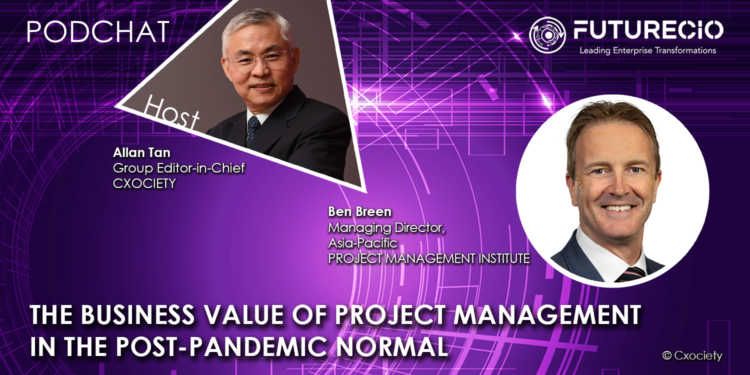Any given project left to its own devices will likely run amok, its deadline for completion extended and therefore go over budget. Worst case scenario – the project is deemed a failure, some people get blamed, and so on. Of course, why this happens can be many reasons, including participants in the project having different priorities and interests, as well as lack of leadership oversight.
According to the Project Management Institute, adhering to project management methods and strategies reduces risks, cuts costs, and improves the success rate.
Ben Breen, global head of construction and managing director, Asia-Pacific with the Project Management Institute, acknowledged the hiccup the construction industry experienced during the pandemic much of which he attributed to the disruption in the supply chain and manpower issues which separately and combined resulted in higher costs for the industry.
On a positive note, he pointed to the PMI’s Pulse of the Profession survey which noted revealed that Asia-Pacific (APAC) has “rebounded quite well, with project outcomes largely on par with global averages. We are seeing manpower shortage, increasing prices, material shortages will continue in 2022.”
He is optimistic APAC’s construction industry is set for considerable growth, although that comes with challenges.
“In any largescale construction project, myriad risks exist to cause disruptions and delays, but there are best practices for mitigating these risks and resolving disputes. People realise they need to improve themselves to upskill, to stay ahead of the curve. PMI partners with project professionals to empower them with tools to upskill themselves,” he added.
He observed that countries like China and Singapore are staying ahead of the curve by leveraging the power of technology and innovation in construction.
Importance of project management
According to Breen, project management is industry agnostic. Everybody is doing an element of project management with a simple task they do every day. Understandably, the more complex the project, the more skills are needed to tackle.
“We believe the future of work is going to be based around what we called a project economy. Both enterprises and individuals will need to adapt in The Project Economy,” he opined.

In a Harvard Business Review article, Antonio Nieto-Rodriguez, an expert in project management and strategy implementation and co-founder of Strategy Implementation Institute, says as we transform to a project economy, one of the hurdles will be leaders who do not appreciate the value of projects and write them off as a waste of time.
He suspects this underappreciation can be attributed to the perception that (project) methods are too complex to be easily applied.
Best practices for project management
Breen says it is important to understand what skills are needed to be learned.
“We have seen different skillsets coming in, for example, communications and collaboration. They are very important. If we can combine those with a technical capability that project managers have traditionally had, that sets us up to deliver project management results more efficiently,” he continued.
Skills that shine during a crisis
“Apart from the power skills I mentioned, another important thing is innovation. In the last two years, we have seen innovative projects in energy, climate change, vaccine production and rollout, tech-enabled healthcare delivery. These could have happened for quite sometimes but now people with those skills are leading the way,” said Breen.
Persistent talent gap
The PMI report, Talent Gap: Ten-Year Employment Trends, Costs, and Global Implications 2021 cited three reasons for the persistence of the talent gap:
- An increase in the number of jobs requiring project management-oriented skills
- Higher demand for project professionals in emerging and developing countries due to economic growth
- The rate of retirement from the workforce
Breen opined that as organisations become more digital, data and how to use it becomes more important. It is here that project talent becomes even more critical.
“Our Talent Gap Report reveals that the global economy needs 25 million new project professionals by 2030. The talent gap is likely to impact every region, which could result in a potential loss of up to $345.5 billion in global GDP by 2030 if jobs go unfilled if not closed. We are trying to bridge the gap,” he added.
Action items for business leaders
Breen conceded that the pandemic is still going to play a large role for the years to come. With every adversity, there is an opportunity for transformation.
He cites several megatrends, including digital disruption, climate change, demographic shifts as impacted by declining fertility rates and ageing population, economic shifts with supply chain disorder and the rethinking of globalisation, and civil, civic and equality movements.
He believes that leaders must be aware and constantly reprioritise what is important, acquire new skillsets, and respond to the new demand.
“These trends indicate global shifts and trends that will impact economies and countries. Business leaders need to build resilience, forecast situations to take quick actions, be agile and upskill and reskill the workforce to stay ahead,” he suggested.
Advice to industry leaders
According to Breen, the need for project management skills is more important than ever. Leaders should look to weave integration, creativity, and social impact into the projects of their organisation. Leaders need to ensure that the learnings from the pandemic are put in action while defining their own ‘new normal’.
“Leaders also look at what opportunities exist for them to make their businesses agile, more diverse, workforce more skilled, and projects that create a social impact and build a better world to live in,” he concluded.
Click on the PodChat player to listen to the full discussion with Breen on the value of project management for any business.
- Please provide a quick recap of Asia’s construction sector between 2020-2021?
- How have industry participants responded during the crisis?
- How important is project management in the construction sector?
- Do other industries place similar importance to project management?
- How have best practices in project management
- In the new digital pandemic normal, what skills have stood out to be most valuable when it comes to project management?
- How have businesses/industries respondended to this new demand?
- In 2022, what megatrends will elevate project management to higher importance?
- How should business leaders address these megatrends?
- What qualities must leaders put forward in 2022 and beyond?
- Given the continuing uncertainty, what is your advice to industry leaders to help them ride the uncertainties and come out leading the marketplace?




